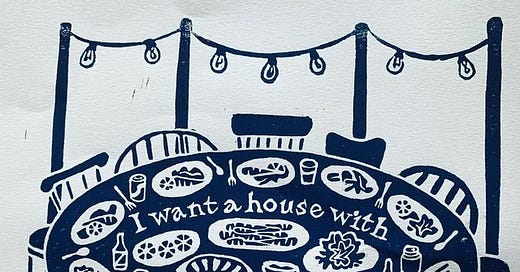The Table is Already Crowded—and Yet There’s Room
From the series: Making Space at the Table: The Slow, Holy Work
“People will come from east and west and north and south, and will take their places at the feast in the kingdom of God.”
—Luke 13:29 (NRSV)
There’s a mystery at the heart of the Eucharist: the table is already full—and yet, there is always room.
This is not a polite sentiment. It is a theological claim. At every celebration of Holy Communion, we enter into a reality that transcends time and space. We gather not just with those in the pews beside us, but with “angels and archangels and all the company of heaven,” as the liturgy reminds us. With saints and prophets, with strangers and enemies, with the forgotten and the unborn. It is a feast already in progress.
To understand the slow, holy work of inclusion, we must begin here: the table does not belong to us. We are not the hosts. Christ is both host and meal. We are not in charge of the guest list—we are guests ourselves.
In his classic work For the Life of the World, Alexander Schmemann writes that the Eucharist is the entrance into the risen life of Christ.¹ It is not an escape from reality but a deeper entry into what is truly real. Through the Eucharist, we learn to see the world as God sees it—shot through with glory, held together by grace, aching with hunger for the kingdom.
But what happens when the Church forgets this? When we begin to treat the table as something we own—as a place for those who look, think, or behave like us?
Theologian Willie James Jennings warns of this danger when he writes: “The Eucharist was meant to announce the death of death, but we have made it into the death of welcome.”² The feast becomes a fence. The sacrament becomes a sorting mechanism. And the hospitality of Jesus, who ate with tax collectors and sinners, becomes a ritual for the righteous.
Making space at the table means recovering our Eucharistic imagination. It means seeing every person—not as an interruption to our worship, but as essential to it. It means recognising that the table was never supposed to be efficient, or tidy, or predictable. It was always meant to be crowded.
In Luke 14, Jesus tells the parable of a great banquet. When those invited refuse to come, the host sends servants into the streets and alleyways: “Bring in the poor, the crippled, the blind, and the lame.” Still, there is room. So the invitation is expanded further—beyond the city limits, to the roads and hedgerows.
This is not simply a story about broadening access. It is about redefining belonging. The people once considered outsideare now at the centre of the feast. Those who had no place have been given the place of honour. And the table expands to hold them.
The Eucharist is not a closed circuit. It has no upper limit. It can be celebrated in a cathedral or a prison cell, with silver chalices or chipped mugs. And every time it is shared, it asks us: Who are we leaving out?
Who do we not see in our churches? Who feels the need to translate themselves to be accepted? Whose gifts are overlooked? Whose presence is quietly resented? These are not abstract questions. They are Eucharistic ones. Because the Body of Christ is not whole without them.
To make space at the table is not just to invite others in. It is to be changed by their presence.
Jean Vanier, founder of the L’Arche communities, writes: “To welcome is to make the other feel at home and at ease. It means also to be transformed by the other. It implies an openness to change.”³
If we welcome others only on the condition that they don’t disrupt us, we’re not practicing hospitality—we’re reinforcing control. But true welcome always involves shared vulnerability. After all, that’s what Eucharist is. Christ broken. Christ given. Not a performance, but a pouring out.
To welcome is to admit: I don’t have this all figured out either. I need grace, too. Let’s share it together.
The table is already full. That’s what makes it holy. That’s what makes it hopeful. There is no scarcity here. No need to guard the seats or vet the guest list. If the kingdom is anything, it is excess—grace upon grace.
But the table also asks something of us. It asks that we lay down our pride, our need for order, our desire for control. It asks that we unlearn habits of exclusion. It asks that we begin to see with Eucharistic eyes.
We don’t make space at the table because it’s trendy, or because we feel guilty, or because someone told us to. We make space because the table has already made space for us.
The slow, holy work begins there. With our own welcome. With our own place at the feast. With the humility of a guest.
Come. Sit. Be fed. And make room.
References
Alexander Schmemann, For the Life of the World, St. Vladimir’s Seminary Press, 1973.
Willie James Jennings, The Christian Imagination: Theology and the Origins of Race, Yale University Press, 2010.
Jean Vanier, Community and Growth, Paulist Press, 1989.





Thank you again and again for sharing your experience, strength and hope is the blessed sacrament of the Feast.
I love this. I’ve stopped going to Mass because I’ve begun to struggle so much with a table that is not open to everyone. I don’t understand it so I feel like I’m not welcome either. I’m working through it!